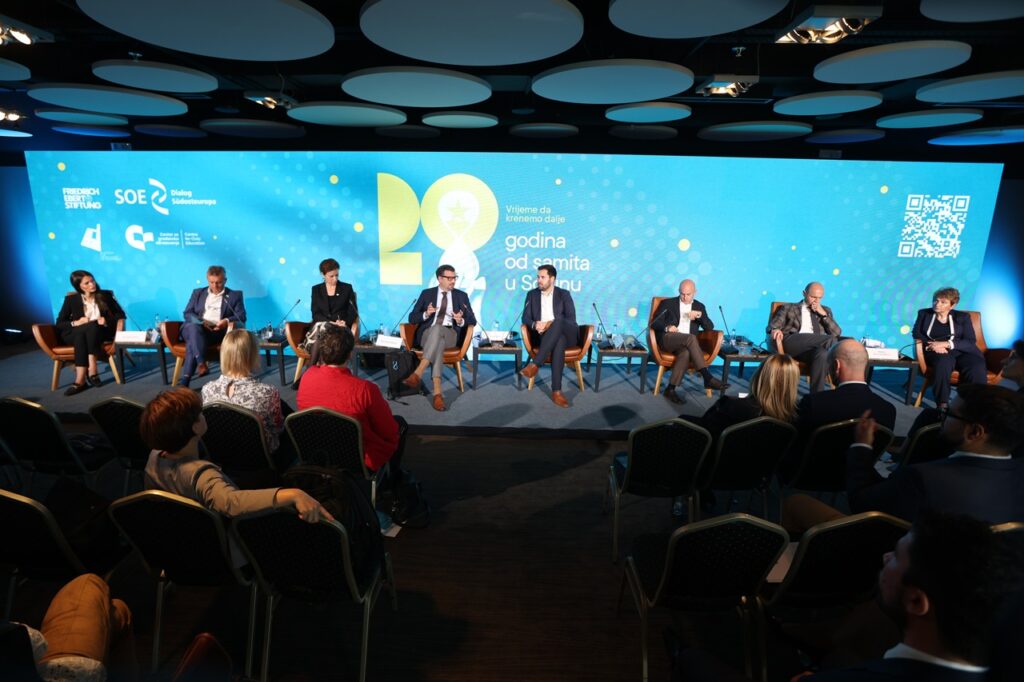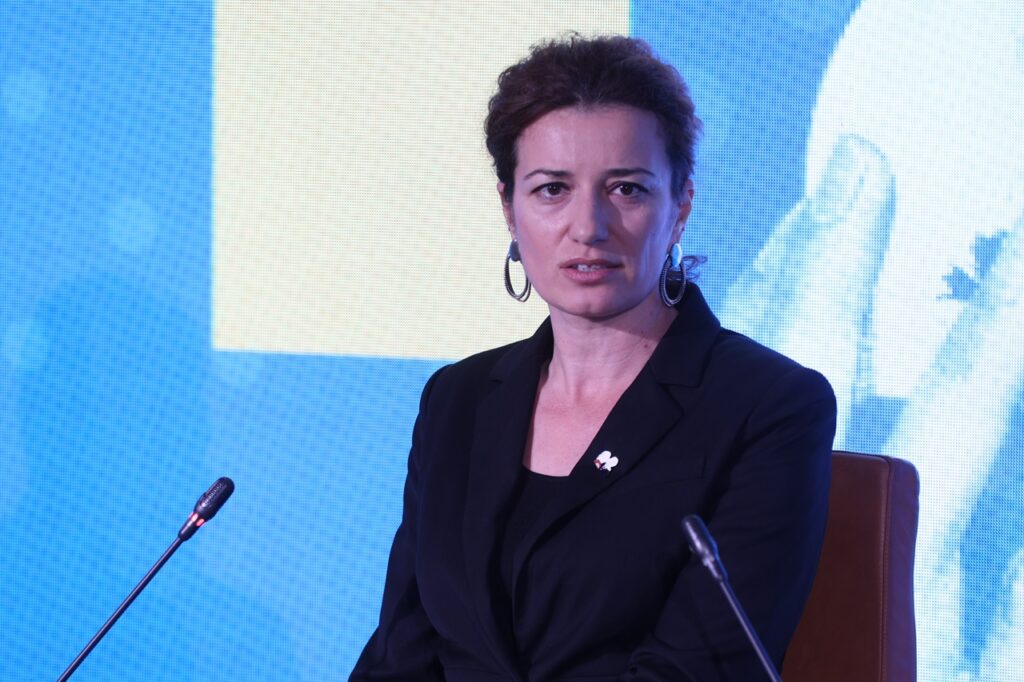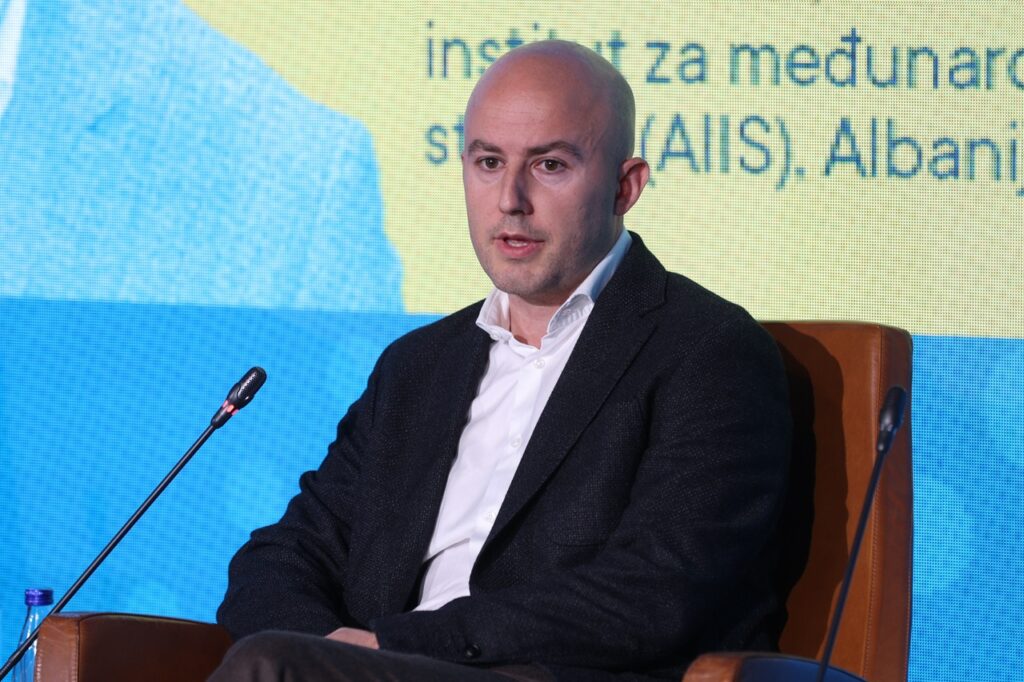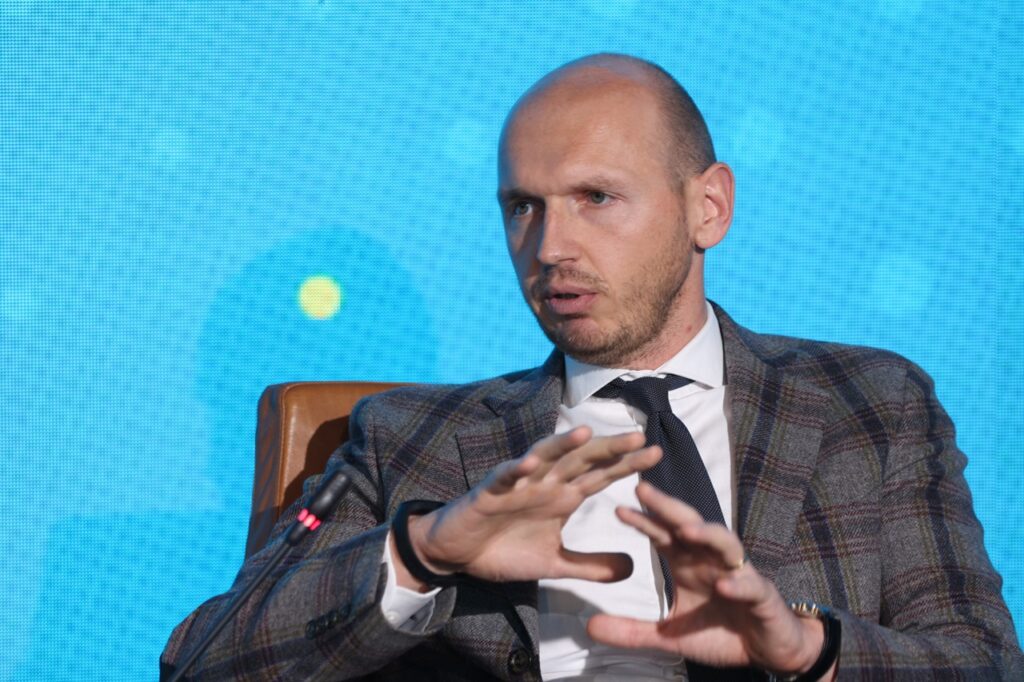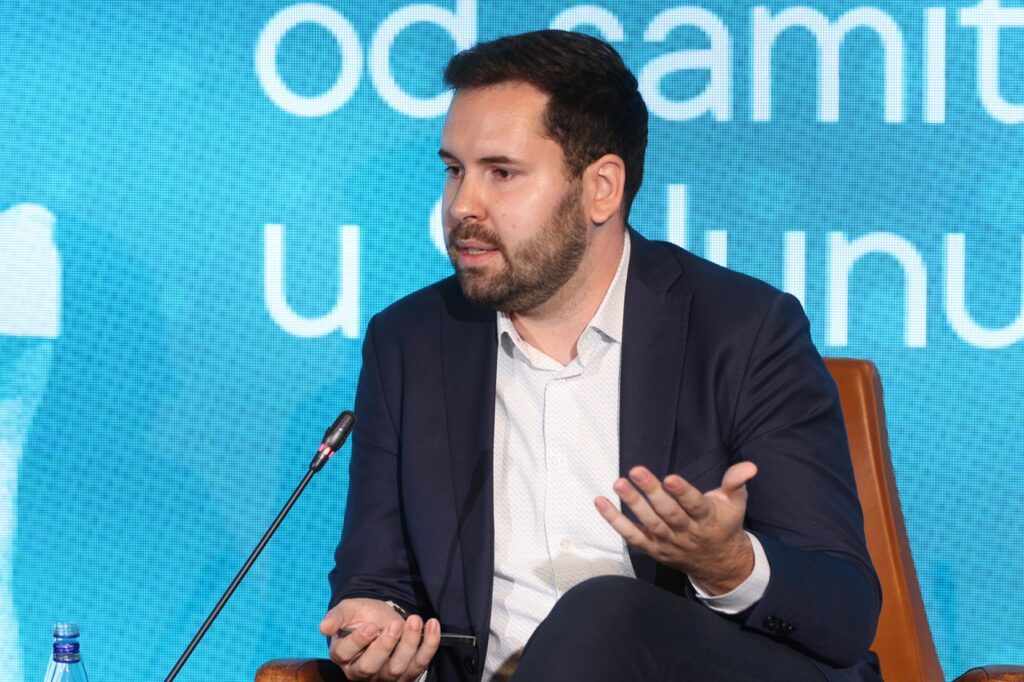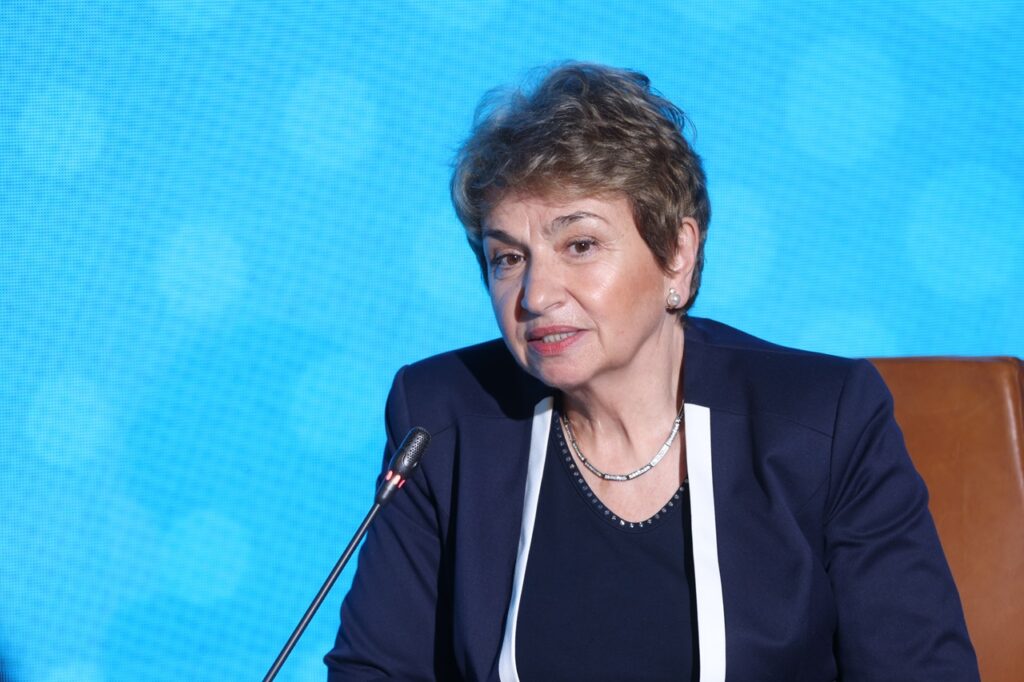A stable, European, and civic government in Montenegro can complete all the reforms from the process of accession to the European Union (EU) in four years, but it is questionable whether Montenegro will get such a government, said former Minister of European Affairs of Montenegro and member of the BIEPAG, Jovana Marović, during the panel “Effects and Results of the New Negotiating Framework and New Models of EU integration” at the conference organized by the Centre for Civic Education (CCE), Friedrich-Ebert-Stiftung (FES), and the Regional Academy for Democratic Development (ADD) titled “Time to move on – 20 years of Thessaloniki Summit”.
She pointed out that there are three sets of circumstances due to which Montenegro is not part of the EU even after 11 years of negotiations.
“First, since the beginning of the negotiations, I have not noticed a genuine willingness to bridge the gap between the technical and political aspects of the negotiation process. We have success in the technical part but not in the political part. We are still debating whether political parties have the will and desire to join the EU,” stated Marović. On the other hand, she noted that the EU advocates the principle of merit-based progress but does not apply it in practice. As she added, the third set of circumstances relates to the fact that neither the EU nor the political elites having a clear vision of ‘what next with the Western Balkan countries.’
“My recent experience in the Government of Montenegro shows that political parties prioritize their interests above all. European integration is just a mantra to get votes of the citizens,” Marović explained.
She mentioned that despite the vast majority of citizens supporting EU membership, political parties cannot reach a consensus on crucial issues that would accelerate the European integration process. “I primarily refer to the interim benchmarks for Chapters 23 and 24 that we received ten years ago. Over the past year, each political party has blocked at least one appointment of judicial officeholders at some point. Without that political aspect, we cannot accelerate European integration,” Marović emphasized.
She said that the greatest responsibility lies with the Government, but political parties also bear responsibility for Montenegro still not entering the final phase of the negotiation process.
Marović pointed out that Montenegro has a 100% alignment with the common foreign and security policy with the EU, but questioned what Montenegro has gained from it. She asked, “How does the EU evaluate this if one country experiences certain damages due to this alignment, while another only receives a lower rating in the annual report?”
In her view, the new methodology has not fundamentally changed anything in Montenegro’s accession process. “Without more active involvement on the ground by member states, without sanctions and incentives, without cluster reporting, I don’t see that the new methodology has fundamentally changed anything in the entire story,” Marović noted.
“The most significant problem remains – too many frameworks for integration and too little integration. A year ago, we signed three agreements (within the Berlin process) that did not bring anything fundamentally new. If the common regional market is the primary framework for integration, then the question arises whether Montenegro must perpetually wait for those less prepared states,” Marović said.
She described the situation in Montenegro as a defeat for the European Union. “You cannot blame only the Western Balkan states for the lack of democracy“, she stated.
She said that it is impossible to determine whether any state will be ready to join the EU by 2030, but it is possible to create individual roadmaps for each country. “A stable, European, and civic government in Montenegro can fulfil all the reforms in four years. That is the essence, whether we will get such a government – I really don’t know, and I’m not sure,” Marović concluded.
Chairman of the Governing Board of the European Policy Centre (CEP) from Serbia, Srdjan Majstorović, noted that without political will, there is no chance of making progress in European integration.
“In the past 20 years, there has been some kind of cohabitation, a lack of political will on both sides – both the EU and the Western Balkans. Credibility has been lost. No one here has shown the capacity to believe that progress will come,” said Majstorović.
He mentioned that the 20 years since the Thessaloniki Summit represent an excellent opportunity to “sit down again” and define the future of Europe after 2030 as well as that this kind of “renewal of vows” can be symbolic but also a sign of restoring credibility to the entire process.
According to him, the EU remains seriously committed to the strategic importance of the enlargement process. “We need a new agreement, a New Deal, based on which we will take the next steps, but again, without clear political principles, which I currently do not see, it will be difficult for us to take these steps,” Majstorović assessed.
Senior Researcher at Albanian Institute for International Studies, Ledion Krisafi, noted that over the past year and a half, Albania has made significant progress, which may not necessarily be directly related to the opening of the negotiation process with the EU. “What Albania is doing now is related to the judicial reform that has been ongoing for several years and has completely changed the country’s image,” Krisafi said.
He mentioned that over the past few months, there has been an increase in reports of corruption and organized crime, and a message has been sent that there are no untouchable ministers, politicians, or even prime ministers. “That’s how I see the process, not so much directly related to the negotiation and accession process but more related to judicial reforms,” Krisafi explained.
Regarding the revised methodology for EU accession, he said that the EU does not want the Western Balkans to become a problem on the ground. “Countries like Serbia – with authoritarian regimes, regardless of the methodology, can hardly expect to be part of the EU. So, much depends on us,” Krisafi said.
He also mentioned that the new methodology could be a path to the EU and a way for the EU to resolve its own dilemmas and problems. “If we look at the previous methodology, we have Montenegro, where the situation is better compared to Serbia. The methodology doesn’t have much to do with what the country is doing. If the EU wants to make the Western Balkans part of the EU in six or seven years, they will do it whether we are ready or not,” Krisafi said.
Executive Director of the European Policy Institute of Kosovo, Demush Shasha, stated that Kosovo’s path to accession has always been linked to the dialogue with Serbia, and the next step towards obtaining candidate status for Kosovo is closely tied to progress in the dialogue.
“When it comes to the enlargement methodology, I believe that after four years, we can assess a certain policy. It has been announced that the new methodology will be more predictable. We will have a more credible and dynamic process,” Shasha said.
He assessed that there have been visible changes in the enlargement process after Russia’s aggression against Ukraine.
“Something unprecedented has happened when it comes to enlargement. By the end of the year, Ukraine will start negotiations. So, from the moment Ukraine and Moldova submitted their applications to the time when negotiations begin, 20 months will pass,” Shasha added, noting that this is a record so far.
According to him, the EU has never acted so quickly and predictably in the history of enlargement, stating that the reason for this is Russian President Vladimir Putin, indicating that the enlargement process “goes beyond paper and documents,” i.e. that politics dictates everything.
In the next few months, the EU will have a unique opportunity to open accession negotiations with Ukraine and Moldova and grant candidate status to Kosovo, but also a need to make progress in negotiations with all countries in the region, including Bosnia and Herzegovina, Shasha added.
“I hope that leaders will recognize the capital of EU enlargement and the peace, prosperity, and stability it will bring to the region,” Shasha concluded.
Edo Kanlić, Coordinator of Initiative for Monitoring of European Integration of Bosnia and Herzegovina, stated that the start date of negotiations with the EU is an important issue for Bosnia and Herzegovina, but he personally places more importance on the capacity of state institutions to conduct negotiations, even in technical aspects. “Institutions lack knowledge and capacity in certain areas. It’s not just about the date,” Kanlić said.
He expressed dissatisfaction with the way EU institutions communicate messages with institutions in Bosnia and Herzegovina.
Commenting on his country’s position, Kanlić said that the Macedonian scenario with Bulgaria would be a joke compared to how Croatia will treat Bosnia and Herzegovina during the accession process.
Secretary General of RYCO, Albert Hani, stated that it is the responsibility of Western Balkan countries to produce more results in line with European values. “It’s easy to criticize others, but we believe that we are creating a platform in which we will realize that we cannot progress on our own. If we are together, we will progress,” Hani added.
Speaking about the Berlin process, Hani mentioned that RYCO is focused on trust-building projects.
He stated that the majority of young people working in the administration want to leave that sector.
“This leads us to another problem – the narrowing of the capacities we have. Retaining employees is a significant issue, and we need to address all criticisms and provide suggestions for concrete solutions,” Hani said.
Former Bulgarian Deputy Prime Minister and Ambassador to Montenegro, Meglena Plugachieva, said that after the war in Ukraine and the recent escalation in the Middle East, it is time for the EU to redefine its geopolitical agenda.
“Both the EU and the Western Balkans need each other for economic and political reasons to reduce the influence of third great powers,” Plugachieva assessed. She said there is a threat that these influences will become even greater because there is no clear vision of the region’s accession to the EU.
Plugachijeva emphasized that the methodology is not the key to enlargement but rather a matter of political will and concrete results that are necessary to achieve new moments regarding accession. “I believe it is necessary to think about new ideas and proposals coming from the EU, specifically from French President Emmanuel Macron, who has suggested the establishment of a European Political Community (EPC) as something necessary,” Plugachieva said.
She stressed the need for a clear vision and clearer deadlines for the Western Balkans.
MINA

